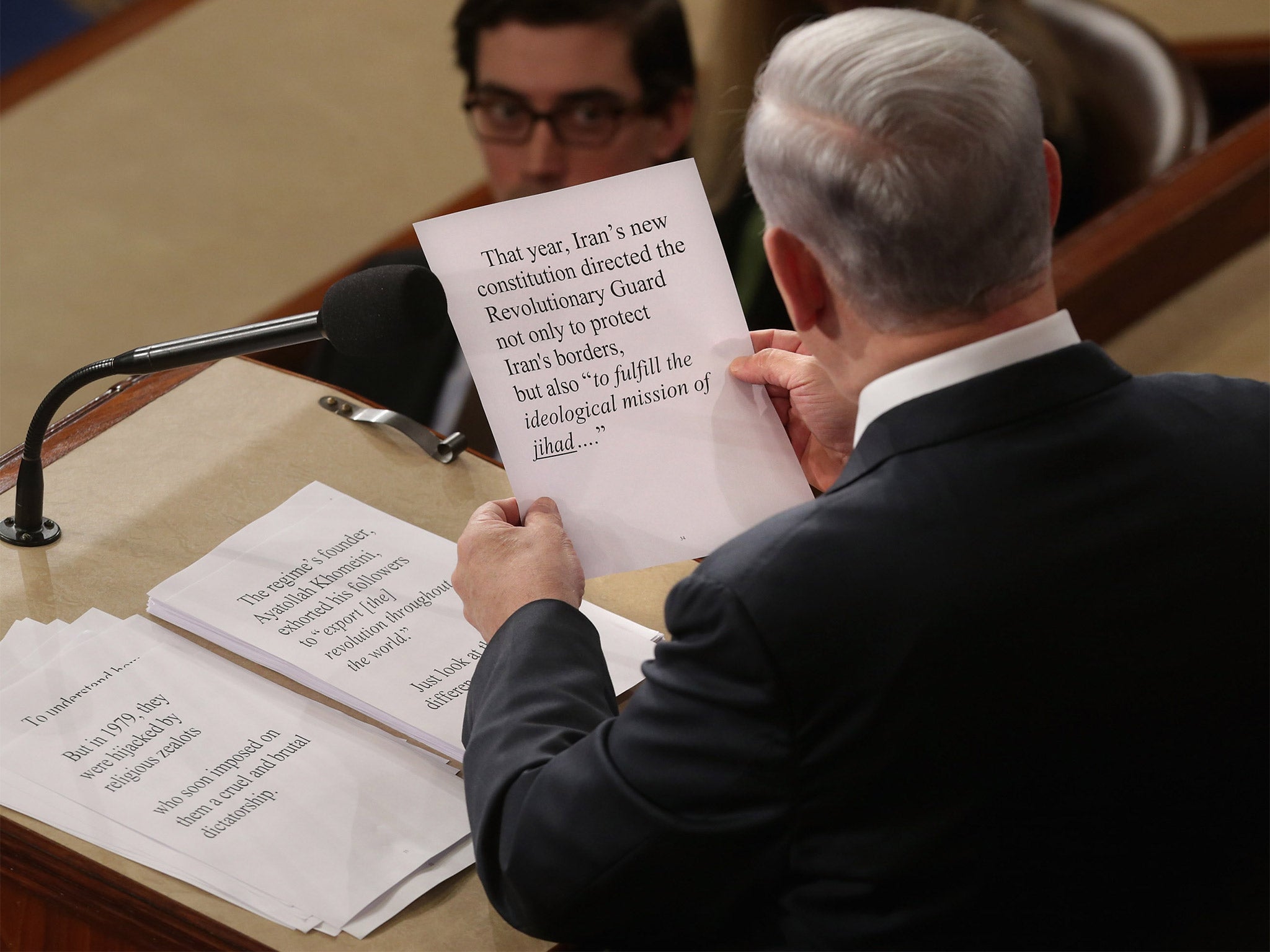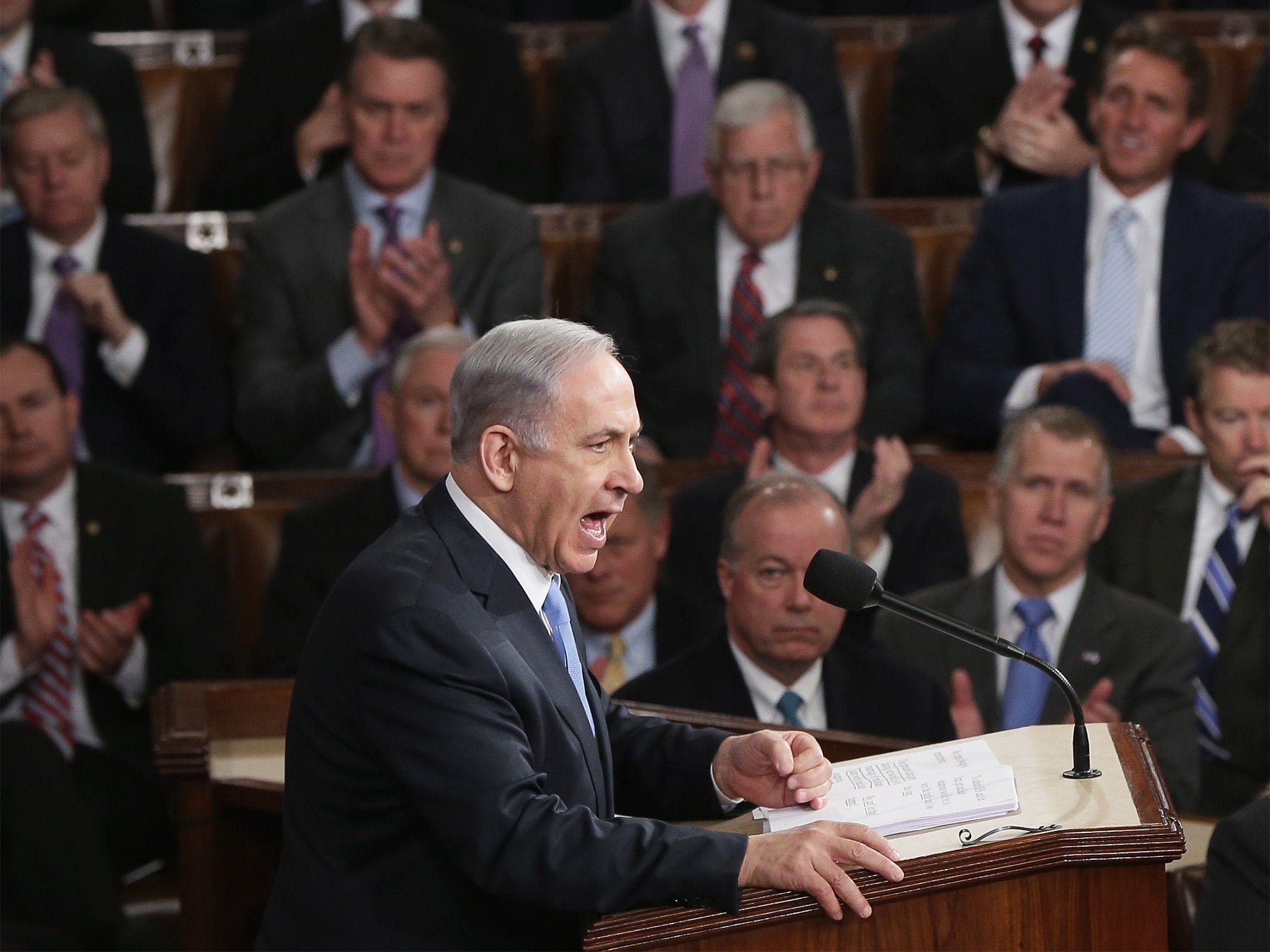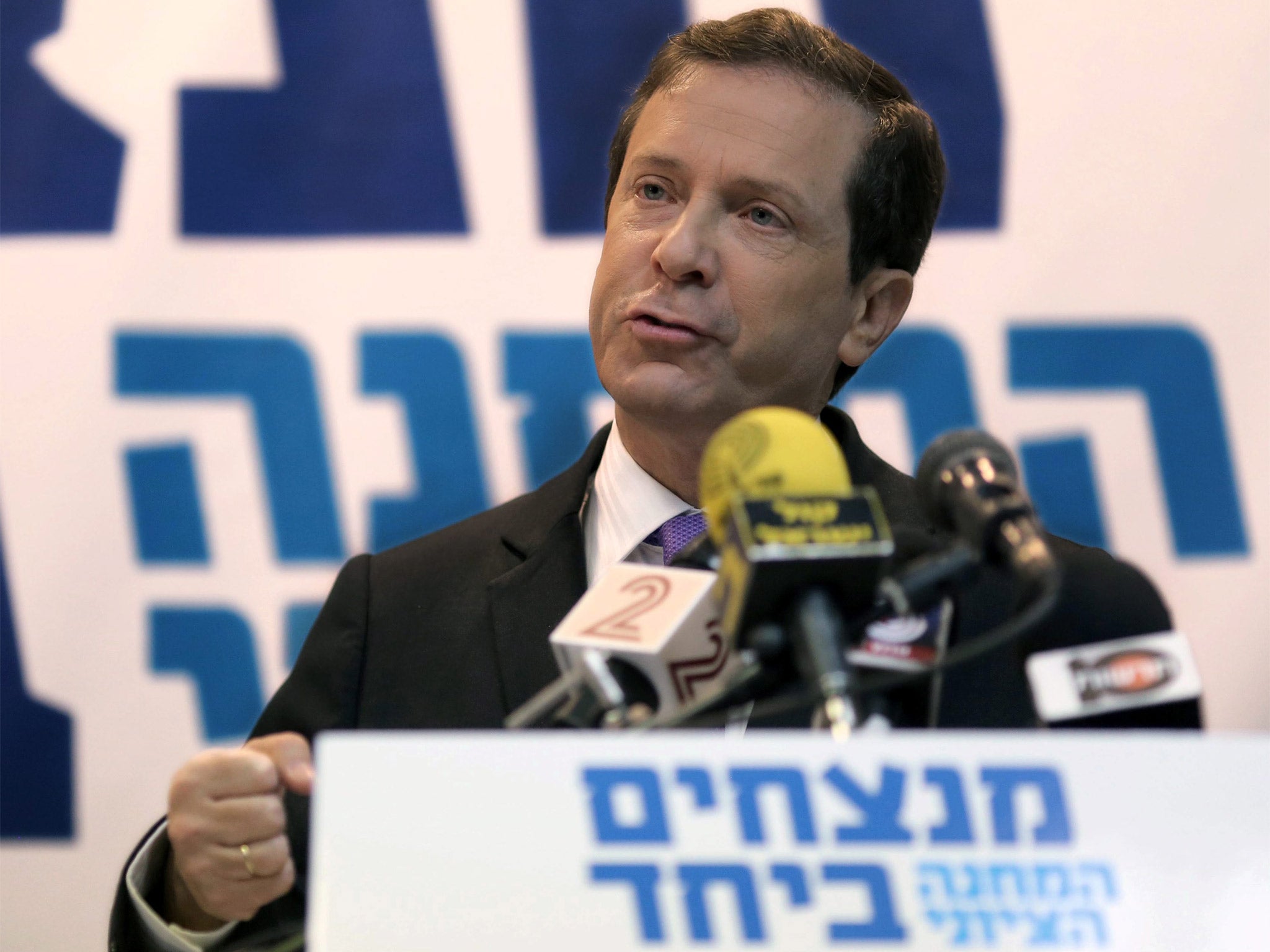Benjamin Netanyahu speech to Congress: Israel leader's nuclear war of words provokes Washington fall out – even though Obama wasn't there to hear it
Iran will be 'guaranteed lots of nuclear weapons' under Obama's arms enforcement deal, the Israeli Prime Minister told the US Congress

An unbridled Benjamin Netanyahu, the Prime Minster of Israel, last night accused the United States and its allies, including Britain, of pursuing an arms enforcement deal with Iran so weak that it would all but ensure that it acquires nuclear weapons, catapulting the world into a “nuclear nightmare”.
“That deal would not prevent Iran from acquiring nuclear weapons, it would guarantee it – lots of them,” Mr Netanyahu said in a highly anticipated speech to a joint meeting of Congress that sounded like the diplomatic equivalent of a blunderbuss being fired at the nation that has sponsored Israel’s survival.
His address, which drew repeated applause from an audience from which as many as 50 Democrats had absented themselves, had attracted the ire of the White House even before it was made. While Mr Netanyahu did not expose parts of the deal currently under secret consideration, as some US officials had feared he might, his speech was none the less an unabashed attack on one of President Barack Obama’s most prized foreign policy goals, an accommodation with Iran on its nuclear ambitions.

The response from the other end of Pennsylvania Avenue was largely dismissive. “On the core issue, which is how do we prevent Iran from obtaining a nuclear weapons… the Prime Minister did not offer any viable alternatives,” Mr Obama commented, saying he had not seen the speech but read a transcript. There was “nothing new” in it, he added.
“If anyone thinks this deal kicks the can down the road, think again,” Mr Netanyahu declared at one point. “When we get down that road, we’ll face a much more dangerous Iran, a Middle East littered with nuclear bombs and a countdown to a potential nuclear nightmare.”
Lasting 40 minutes, his address branded Iran a nation in the grip of a “genocidal” regime intent on “gobbling up” its neighbours and destroying Israel. He also implied that the deal, now in the critical and possibly final stages of negotiation in Geneva, was the product of self-delusion and naïvety on the part of US and its allies.
“Iran has proven time and again that it cannot be trusted,” regardless of any promises to allow international inspections of its facilities, he said. “The greatest danger facing our world is the marriage of militant Islam with nuclear weapons.”
Mr Netanyahu singled out the notion that Mr Obama had himself spelled out on Monday, that the curbs to be imposed on Iran’s nuclear industry would last 10 years. A blink of an eye in the life of Israel, he said. Thereafter there would be no barrier to Iran having nuclear arms.
“Iran could have the means to deliver that nuclear arsenal to the far reaching corners of the earth, including every part of the United States,” he contended. “That is why this deal is so bad. It doesn’t block Iran’s path to the bomb, it paves Iran’s path to the bomb.”
In a Hemingway flourish, he added: “This deal won’t be a farewell to arms; it would be a farewell to arms control.”
Earlier, Mr Obama staunchly defended the approach taken with Iran by the US, the four other permanent members of the UN Security Council and Germany. The deal under discussion “would be far more effective in controlling their nuclear programme than any military action we could take, any military action Israel could take and far more effective than sanctions will be,” he said in a filmed interview with Reuters on Monday.
“There’s no expert on Iran or nuclear proliferation around the world that seriously thinks that Iran is going to respond to additional sanctions by eliminating its nuclear programme,” the president added.
In a passage clearly meant to compare the approach being made to Iran with the appeasement of Adolf Hitler, the Israeli prime minister noted the presence in the public gallery of Holocaust survivor and Nobel Prize winner, Elie Wiesel. “I wish I could promise you, Elie, that the lessons of history have been learned,” he intoned. “I can only urge the leaders of the world not to repeat the mistakes of the past.”
He added: “Iran is not merely a Jewish problem any more than the Nazi regime was merely a Jewish problem. It poses a great threat not only to Israel but to the peace of the entire world.”
Mr Netanyahu clearly implied that part of the lure of a deal with Iran was the notion it might help with the destruction of the Islamic State, or Isis. That also was a mistake, he said. “Don’t be fooled. The battle between Iran and Isis doesn’t turn Iran into a friend of America… The enemy of your enemy is your enemy.”

In Israel, Mr. Netanyahu’s challenger in the elections, Isaac Herzog, head of the Labour party led Zionist Union, said the speech would widen the rift with the Obama administration. But Alon Liel, former director general of the Israeli foreign ministry, said it would boost Mr Netanyahu’s prospects in what is expected to be a close contest.
“This speech might have saved Netanyahu’s seat as prime minister,” he said. “A lot of the criticism by Labour has been that Netanyahu is isolating Israel but when you see such a show you can see that Israel is not isolated. Netanyahu has shown the public that ‘We can get away with whatever we want’.”
Additional reporting: Ben Lynfield, Jerusalem
Q&A: Doing the deal
Q. What would a new nuclear deal involve?
A. Benjamin Netanyahu’s aim is to stop what appears to be a softening of the US stance on a nuclear Iran, which Israel views as an existential threat. Even as he was addressing Congress yesterday, US officials were in talks with Iran over proposals that could allow Tehran to keep 6,000 enrichment centrifuges and send stockpiles of partially enriched uranium to a third country (probably Russia) for safekeeping, in return for rigorous inspection of its nuclear facilities. Iran says it needs nuclear power to reduce its dependence on oil. America wants to make it impossible for Iran to “break out” from a civilian nuclear programme and build a nuclear bomb within less than a year.
Q. What is the main stumbling block?
A. A key obstacle is that the US and most of the five other powers involved (Britain, France, Germany, Russia and China) want any deal to last at least 10 years, with sanctions eased in stages. Iran wants a shorter-term agreement in return for rapid sanctions relief.
Q. What is Russia’s role?
A. Moscow supplies fuel for Iran’s sole power reactor – built by Russian engineers at Bushehr, southern Iran, and completed in 2012 – and is offering to supply Iran’s plants with low-grade nuclear fuel, which is difficult to convert to weapons-grade material. In November, Iran and Russia agreed to build eight more plants; a second is already under way at Bushehr.
Q. When does the clock stop ticking for a deal?
A. All sides are racing to agree broad terms with Iran by the end of this month, before a final July deadline for a detailed agreement. Congressional researchers say Iran’s economy is 20 per cent smaller now than it would have been without sanctions, and one in five Iranians is unemployed.
The Doomsday scenario
If the talks fail, the US would press for more sanctions, further isolating Iran. Meanwhile Israel has threatened a pre-emptive military strike on Iran’s nuclear facilities. Both possibilities would remain if Iran agreed a deal and then reneged on its terms. So, counter to Mr Netanyahu’s argument, a deal appears the best option, not least because a military strike by Israel would make Iran more determined to build a bomb – and potentially to use it against Israel.
Join our commenting forum
Join thought-provoking conversations, follow other Independent readers and see their replies
Comments
Bookmark popover
Removed from bookmarks